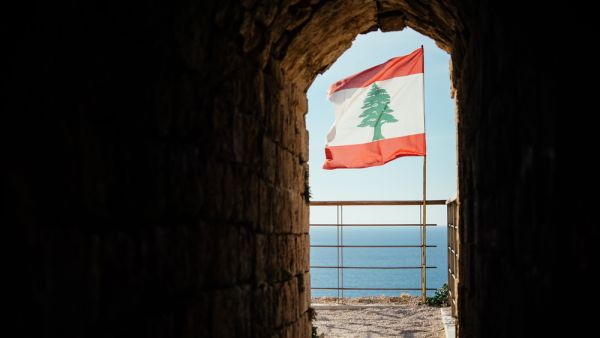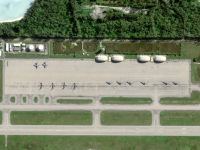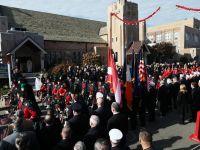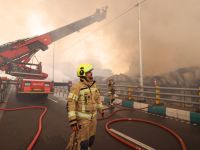Senior Lebanese Shia authority Sayyed Ali El-Amine dealt a major blow to Hezbollah’s exclusivist opposition to the the call for Lebanon’s neutrality issued by Maronite Patriarch Bechara Boutros al-Rai.
During his visit to the Maronite Patriarch Cardinal Mar Bishara Boutros al-Rai at Diman, El-Amine stressed that “the neutrality we are seeking is not a question of truth or falsehood, but rather that of an independent policy and an independent state that will take the homeland out of foreign conflicts.”
He also insisted that neutrality makes Lebanon an independent state, and refers to the state that imposes its authority over all parts of the homeland.
El-Amine’s visit to Cardinal al-Rai came to highlight the fact that there are members of the Shia community in Lebanon who disagree with Hezbollah’s objection to al-Rai’s call for Lebanon’s neutrality.
“We talked about al-Rai’s initiative calling for Lebanon’s neutrality, and it is precisely this neutrality that makes Lebanon an independent entity which must impose its sovereignty and serve as reference for all groups, forces and parties,” al-Amin said following his visit with al-Rai.
The moderate Shia authority, who is widely and highly respected both regionally and internationally, rejected the logic of brute force and bullying resorted to by majorities on minorities. He called for the supremacy of the state as an authority that is independent and free of any partisan or sectarian hegemony.
In sermons delivered over the past two weeks, Patriarch al-Rai had called for respecting Lebanon’s neutrality. A meeting with President Michel Aoun about this very subject followed. And now, the voice of a Shia authority in Lebanon defending neutrality joins that of the Christian authority in Lebanon.
El-Amine is known for his opposition to sectarianism in Lebanon and considers it the antithesis of social justice. He also opposes many of the Shia narratives promoted in Hezbollah’s political discourse and considers them to be divisive and a source of discord within the same society. Because of his positions and opinions, the Shia scholar has become the target of Hezbollah’s ire and constant attacks.
In his meeting with President Michel Aoun at Baabda Palace last week, Patriarch al-Rai explained to the president the reasons that prompted him to launch his latest initiative based on the need for Lebanon’s “neutrality” towards the crises playing havoc with the region.
He assured the Lebanese president that this initiative is not directed against him personally, despite his call for “liberating Lebanese legitimacy from its siege.”
Following that meeting, al-Rai declared that neutrality would bring stability and growth to Lebanon and would save the Lebanese from the condition of poverty and hunger that they are experiencing today.
For his part, the president conveyed to the Patriarch Hezbollah’s rejection of the latter’s initiative or any other call for Lebanon’s neutrality. The radical Shia party has argued that such calls were in fact in the service of Israel and of American policies, and also part of the pressures being exerted on Lebanon right now.
The Maronite patriarch had previously elaborated at length, to President Aoun, on the current regional and international conditions that are having a negative impact on Lebanon for several reasons.
He explained that among the reasons that hinder Lebanon from obtaining any Arab and international aid is the current political situation in Lebanon which happens to be dominated by Hezbollah.
In this regard, the patriarch indicated that due to Hezbollah’s actions and policies, Lebanon has become an integral part of the Iranian camp, and this does not work in its favour.
Lebanon is experiencing an economic crisis that is widely seen as the greatest threat to its stability since the 1975-1990 civil war.
Due to the growing lack of foreign currency in the country, the Lebanese Lira has lost about 80% of its value. Furthermore, bank account holders have been unable to access their deposits, while employment an poverty rates soared.
During the past few days, President Michel Aoun dispatched the director general of the Lebanese General Security Service, General Abbas Ibrahim, to Kuwait and Qatar to try to secure immediate financial assistance from the two Gulf countries, but his mission failed.
In Kuwait, Major General Ibrahim heard Kuwaiti officials praise Lebanon and acknowledge the need to stand by this brotherly country during this difficult stage. He also heard generous promises, but coupled with that, he heard hints that Kuwait was not currently in a position to provide direct aid to Lebanon.
As the country’s economic and political crisis worsens, and in light of the Arab countries’ refusal to support the government of Prime Minister Hassan Diab before first lifting Hezbollah’s grip on this government, the Lebanese did not hesitate to accuse the political class of causing their continued suffering.
Charlotte Karam, a leading academic at the American University of Beirut, expressed everybody’s dissatisfaction with the government by saying: “We are fed up with the established political class … It is a shame that they are letting the country spin out of control in this horrible manner.”
This article has been adapted from its original source.








